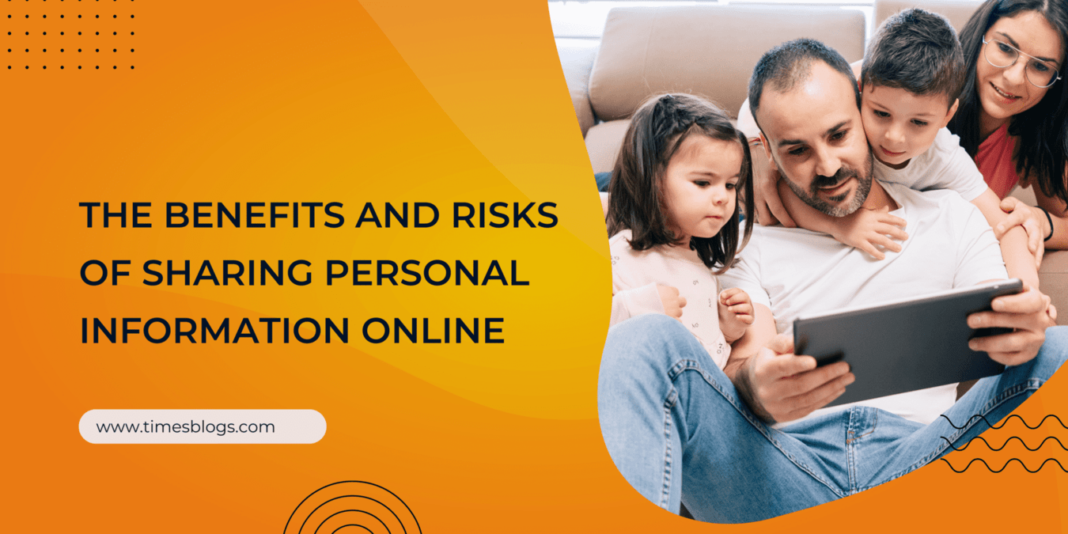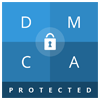In today’s hyper-connected digital landscape, the Internet is no longer just a luxury; it’s an indispensable part of our daily lives. From social networking and online shopping to professional career-building, our interactions increasingly occur in the virtual world. But as we navigate these online spaces, a pressing concern arises: What are the benefits and risks of sharing personal information online? This is a question we can no longer afford to ignore. This comprehensive guide is designed to explore this pivotal issue, diving deep into both the advantages and disadvantages of sharing personal information on the Internet.
While there are undeniable benefits of sharing personal information online, such as career opportunities through platforms like LinkedIn or rekindling long-lost relationships via social media, there are also substantial risks. From the threat of identity theft to the potential for cyberbullying, the Internet is fraught with hazards that could impact you if your personal information falls into the wrong hands. That’s why we’ve put together this guide, providing you with actionable tips to safeguard your digital identity while maximizing the positives of online interaction.
So, whether you’re looking to enhance your career, connect with old friends, or simply make the most of the digital age, this guide will give you the tools you need to do so safely and effectively. We’ll cover the pros and cons of disclosing personal data online, offering real-world examples and practical advice. Our aim is to help you enjoy the benefits of sharing personal information online while being fully aware of and protected from the associated risks.
Table of Contents
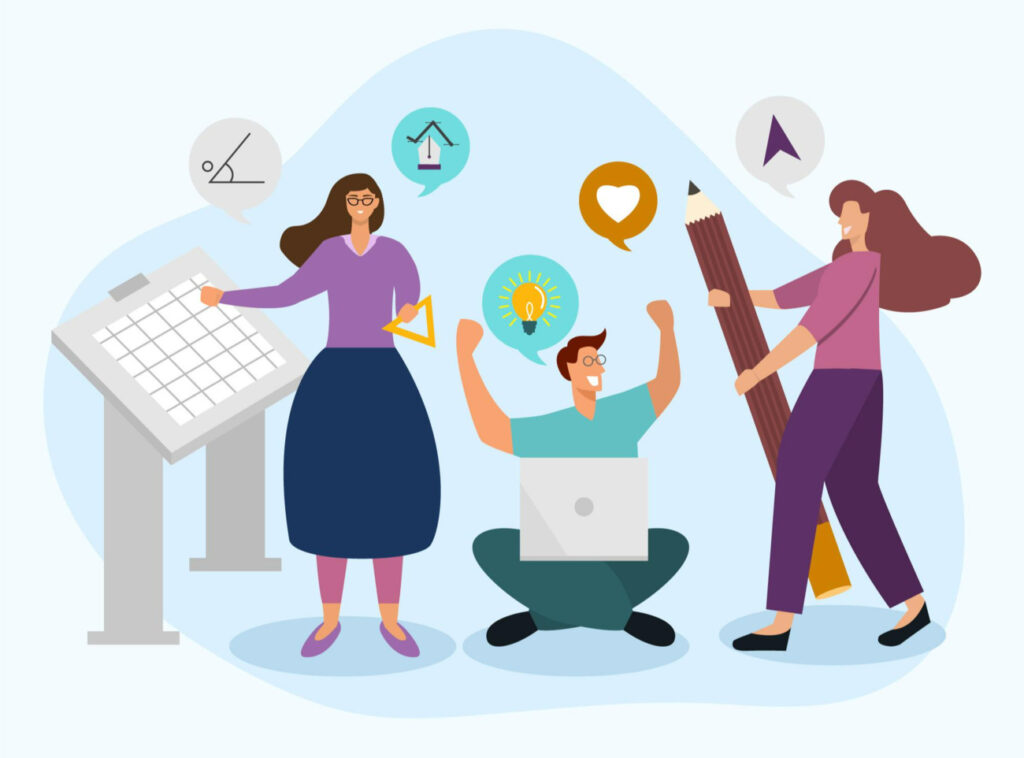
Benefits of Sharing Personal Information Online
The internet has made the world smaller in a good way, weaving an intricate web of social, professional, and personal connections that span the globe. Sharing personal information online serves as the foundation of this connectivity, enabling diverse benefits that enrich our lives. In this expanded discussion, let’s look at these benefits in a more detailed manner.
Building Social Connections
Emotional Bonds
Sharing personal photos, milestones, and daily updates allows us to maintain a meaningful emotional connection with friends and family. For example, Facebook’s “Memories” feature shows you posts from previous years, evoking nostalgia and offering an opportunity to reflect on past experiences.
Community Building
Online communities often require personal information for targeted discussions and resource sharing. For instance, parenting forums often offer more relevant advice when they know the age of your children. The Reddit platform is a perfect example, housing a multitude of specialized ‘subreddits’ focused on specific topics.
Professional Networking
Career Opportunities
Sharing your career achievements, educational background, and skills on platforms like LinkedIn can offer numerous professional benefits. HR departments often scan LinkedIn to find suitable candidates, making it a fertile ground for job opportunities. For freelancers, websites like Upwork and Fiverr serve a similar purpose.
Knowledge Sharing
Discussing professional topics or sharing articles on LinkedIn can establish you as a thought leader in your industry. By sharing informed posts, you gain followers and even catch the attention of industry influencers, thereby expanding your professional network and enhancing your credibility.
Personal and Business Marketing
Personal Branding
In today’s digital age, everyone has the potential to be a brand. Platforms like Instagram and YouTube allow people to transform hobbies and lifestyles into potential income streams. By sharing personal information and engaging stories, you attract followers who are interested in the niche you represent.
Market Segmentation
Businesses can target consumers more effectively by leveraging shared personal information. Facebook Ads, for example, allows businesses to target customers based on diverse metrics like age, location, and even hobbies, providing a more personalized shopping experience.
Access to Customized Content and Services
Personalization Algorithms
Your online behavior, often combined with demographic data, informs algorithms to serve you content that aligns with your interests. Netflix recommends shows you’re more likely to enjoy, while Spotify curates playlists that resonate with your music taste.
Convenience and Efficiency
Apps that require location information—like Uber or food delivery services—demonstrate another layer of personal information use. By knowing your location, these services can offer timely and efficient deliveries, making your life more convenient.
Enhanced Learning and Skill Development
Personalized Learning Paths
Online learning platforms often offer adaptive learning paths based on your past behavior, skills, and interests. When you share information like your professional role or academic background, you get recommendations that can more closely align with your career goals, leading to a more effective learning experience.
Networking and Mentorship Opportunities
Many e-learning platforms also offer community forums or networking features. By sharing personal information, you may connect with peers or mentors within your chosen field, enriching your learning journey. This social aspect of learning can be invaluable in clarifying doubts, gaining deeper insights, and even opening doors for future collaborations or job opportunities.
Streamlined Communication
Context-Aware Services
By understanding your personal habits and needs through data analysis, platforms can offer “context-aware” services that anticipate your needs. For instance, a smart email service might recognize the urgency in your email conversations and prioritize those messages, or even suggest quick replies to speed up your communication.
Language and Translation Features
Some communication platforms leverage personal information to offer features like automatic translation. Knowing your primary language and the region you’re in allows these platforms to provide real-time translation services, making it easier for you to interact with people from different linguistic backgrounds.
Civic Engagement
Political Awareness
Knowing your geographical location and possibly your browsing history related to political topics allows platforms to serve you tailored information on local elections, candidates, and issues. This enhances your ability to make informed decisions when you vote, bringing about a more democratically engaged society.
Community Involvement
By sharing your interests and location, platforms can suggest community events, causes, or groups that you might be interested in. This kind of targeted suggestion can help you find volunteering opportunities, local clubs, or social events where you can get involved and make a real difference in your community.
Healthcare Management
Telemedicine Personalization
Sharing medical history and current symptoms online can improve the quality of healthcare you receive through telemedicine platforms. Doctors can have immediate access to crucial data, allowing for more accurate diagnoses and effective treatment plans tailored to you.
Health Monitoring and Notifications
Wearable health devices often require users to share personal information to provide real-time monitoring and personalized health advice. For example, smartwatches can track your activity levels, sleep patterns, and even alert you about irregular heartbeats, helping you maintain a healthier lifestyle.
Travel and Lifestyle Enhancements
Personalized Itineraries
Sharing travel interests and past bookings can lead to personalized travel experiences. Websites and apps can offer tailored itineraries, suggesting activities and locations based on your preferences and past behavior, thereby enriching your travel experience.
Customized Lifestyle Services
Platforms like Pinterest or Instagram use your browsing history and likes to offer personalized lifestyle tips, ranging from home decor ideas to fitness routines. By understanding your preferences, these platforms can introduce you to new trends or practices that align with your lifestyle goals.
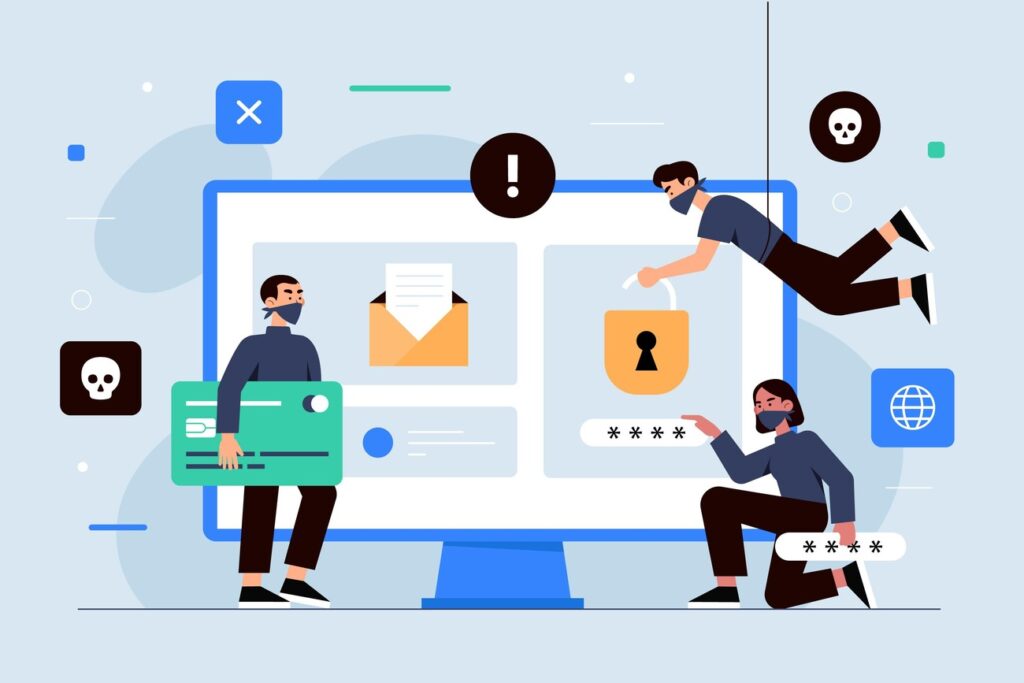
Risks of Sharing Personal Information Online
In the connected world we live in, sharing personal information online seems almost second nature. We post photos from our vacations, check in to our favorite restaurants, and even share life milestones for all to see. Yet, it’s critical to remember that this sharing has another side—a side that exposes us to various risks that could have long-lasting consequences.
From personal safety concerns to the potential for identity theft, the risks associated with sharing personal information online are not to be taken lightly. Beyond the obvious threats are a series of nuanced implications that could affect your professional life, personal relationships, and even your legal standing. As we navigate this ever-evolving digital landscape, understanding these risks is crucial.
Identity Theft
Financial Fraud
Sharing too much personal information can make you an easy target for financial fraud. Cybercriminals can use this data to gain unauthorized access to your bank accounts or make unauthorized transactions in your name. The financial devastation can take years to recover from, and the process of restoring your identity can be complex and stressful.
Medical Identity Theft
Your personal information isn’t just valuable for credit card applications; it can also be used to steal medical services. An individual may use your identity to receive medical treatments, effectively altering your legitimate medical records and potentially affecting future healthcare. Incorrect medical records can lead to misdiagnosis and improper treatment, adding another layer of risk to your health.
Cyberstalking
Real-Life Consequences
Not all risks remain in the virtual world. Personal information can enable cyberstalkers to transition into real-world stalking, locating your home or workplace, which could lead to dangerous situations. This could escalate to physical confrontations, harassment, or even violence.
Emotional Toll
The constant feeling that you are being watched or followed, either online or in the real world, can cause immense emotional stress and anxiety. Beyond invading your privacy, this emotional stress can affect your day-to-day life, impacting your performance at work, your relationships, and your mental health.
Reputation Damage
Professional Consequences
A careless post or an out-of-context photograph can be easily misconstrued, potentially affecting your professional standing. Employers and colleges often look at social media profiles, and negative impressions can cost you opportunities. These setbacks can lead to career stagnation or even job loss, significantly impacting your future.
Relationship Strain
Reputational damage can extend into your personal life as well. Friends and family may distance themselves if they find your online activities disagreeable or if they feel you are sharing too much information that puts them at risk. This can lead to strained relationships, creating emotional stress and isolating you from your support network.
Addiction
Mental Health Implications
The addictive nature of social media platforms can result in more than just lost time. Overuse has been linked to a variety of mental health issues, including depression and anxiety. The constant need for validation through likes or comments can exacerbate these conditions, contributing to a cycle of dependency and worsening mental health.
Physical Health Risks
Constantly being plugged in can also have physical repercussions. The sedentary lifestyle associated with excessive screen time can contribute to a host of health issues, including obesity, sleep disorders, and eye strain. Prolonged screen exposure can lead to issues like carpal tunnel syndrome or chronic neck pain, adding another dimension to the risks.
Data Breaches and Hacks
Exposure of Sensitive Information
Even if you trust the platform you’re using, it’s not immune to data breaches. Hackers could gain access to databases containing your personal and financial information, leading to multiple risks if this data is sold or misused. The breach not only risks your personal information but can also make you wary of using online services in the future.
Loss of Control
Once your information is exposed in a breach, you lose control over it entirely. It could be sold, traded, or exploited in various ways across the dark web. The consequences can be long-lasting, affecting your financial, personal, and emotional well-being for years to come.
Unintended Future Uses of Data
Permanent Digital Footprint
Anything you post online is likely to be there forever. Information that might seem harmless now could be used against you in the future for things you can’t yet foresee. Employers, insurance companies, or even romantic interests could one day use this information to make judgments about you.
Third-Party Usage
Your data is often not only accessed by the entity you’re directly sharing it with, but may also be sold to or accessed by third parties. This can range from advertising to data analysis to more nefarious uses. The proliferation of your data across various platforms can magnify your exposure to risks and potentially compromise your privacy on a large scale.
Psychological Manipulation
Personalized Advertising
The more information you provide online, the easier it is for companies to target their advertising. This can influence your opinions and behavior in subtle ways. These targeted ads can shape your perception and consumer habits, leading you to make decisions you might not have otherwise made.
Social Engineering
Scammers can use small pieces of personal information to build trust and manipulate individuals into divulging more significant pieces of information. This could range from phishing attacks to tricking you into making harmful financial or personal decisions. The risks of such manipulations can have a domino effect on your life, affecting both your emotional and financial health.
Physical Safety Risks
Home Invasion Risks
Sharing details like your location, daily routine, or even vacation plans can make you an easier target for burglars. Unprotected posts that share your absence from home can tip off criminals, putting not just your property but also your personal safety at risk.
Personal Safety Risks
Sharing your real-time location or plans can make you vulnerable to physical confrontations or attacks. For example, “checking in” at remote or less-populated locations can expose you to real-world dangers. These risks aren’t confined to you alone but can also extend to family members or friends who might be with you.
Loss of Employment or Opportunities
Background Checks
Employers perform extensive online background checks as part of the hiring process. Any personal information that casts you in a negative light could cost you a job opportunity. Additionally, current employers may also conduct periodic checks, so it’s not just potential jobs that are at risk.
Academic Consequences
Many educational institutions search applicants’ digital footprints as part of the admissions process. Negative or controversial information can not only affect your admission but could also disqualify you from scholarships or special programs, affecting your educational path.
Legal Consequences
Slander and Libel Risks
Comments you make about others online could have legal consequences if considered slanderous or libelous. Legal proceedings can be costly and time-consuming, and the damage to your reputation could be irreparable.
Contractual Violations
Sharing certain types of personal information, like workplace details or proprietary information, could violate non-disclosure agreements or other contracts. The consequences can range from fines to termination of employment, adding a legal dimension to the risks you face.
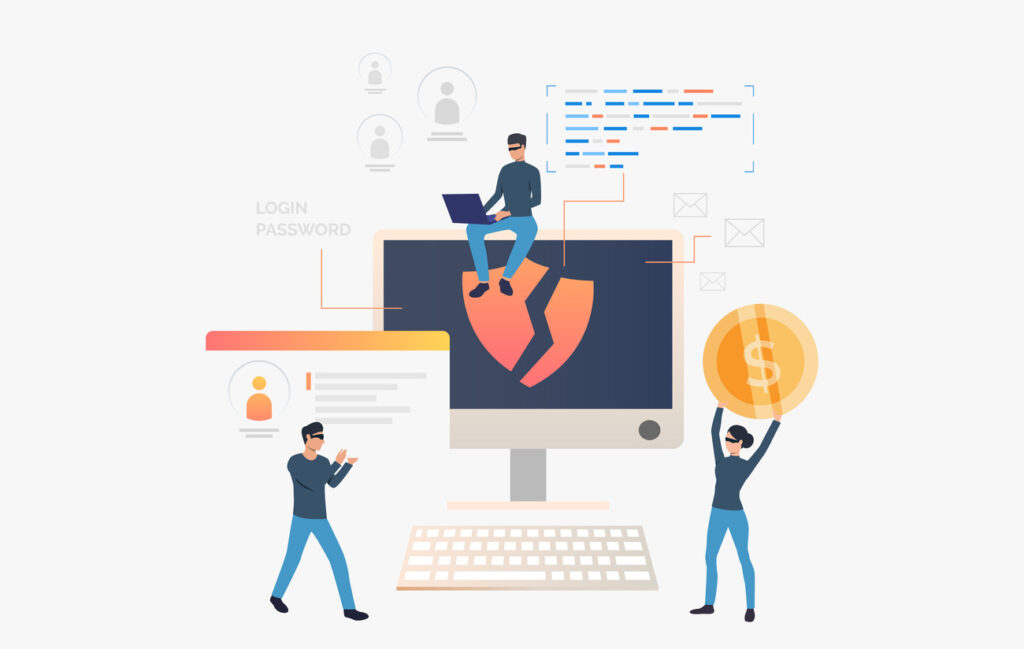
How to Protect Your Personal Information Online
Protecting your personal information online is crucial in today’s interconnected digital world. While sharing personal information can have many benefits, the risks are equally significant. Fortunately, there are several proactive steps you can take to safeguard your data. Here are some tips to help you protect your personal information online:
Use Strong, Unique Passwords
Why it’s Important
Weak passwords are an open invitation for hackers. The easier the password, the less effort a hacker has to put into gaining access to your accounts. Moreover, using the same password across multiple platforms increases your vulnerability; if one account gets hacked, it creates a domino effect, putting your other accounts at risk.
How to Do it
Creating a strong password involves combining uppercase and lowercase letters, numbers, and special symbols. Aim for a minimum of 12 to 16 characters to make the password harder to crack. Password managers can be an invaluable tool in this process, as they can generate and store complex passwords for you, so you don’t have to remember them all.
Enable Two-Factor Authentication (2FA)
Why it’s Important
Two-factor authentication (2FA) is akin to adding a second lock to your door. Even if a hacker manages to guess your password, they would still need to bypass another layer of security, which could be anything from a text message code sent to your phone, to biometric data like a fingerprint.
How to Do it
Activating 2FA is generally a simple process. Look for the security settings in your account, and follow the instructions for enabling 2FA. Many services offer multiple forms of second-factor verification options, including authentication apps like Google Authenticator, SMS messages, or even physical hardware tokens. Choose the method that provides the best balance of security and convenience for you.
Be Wary of Phishing Attempts
Why it’s Important
Phishing is a common and increasingly sophisticated scam where attackers impersonate trusted institutions or people to trick you into disclosing sensitive information. This could be login credentials, social security numbers, or bank account details.
How to Do it
Don’t click on links or download attachments from unknown or untrusted sources. Pay attention to the URL of a website you’re accessing; often, phishing websites will have URLs that look similar, but not identical to, the URL of the institution they’re impersonating. Also, be skeptical of emails or messages that have grammatical errors or that urge you to act immediately to prevent some kind of adverse action.
Keep Software and Systems Updated
Why it’s Important
Software developers regularly release updates not just to add new features but also to fix vulnerabilities that could be exploited by hackers. Running outdated software is equivalent to leaving your door unlocked; you’re inviting trouble.
How to Do it
Most modern software and operating systems offer automatic updates as an option. If this is available, it’s advisable to enable it. For those that require manual updating, make it a habit to check for and apply updates regularly. Also, keep an eye out for news about critical security vulnerabilities that may require immediate patching.
Use a Virtual Private Network (VPN)
Why it’s Important
A VPN is like a secure tunnel that encrypts your data traffic over the internet. This is especially crucial when using unsecured public Wi-Fi networks, like at airports or coffee shops, where attackers are more likely to snoop on data traffic.
How to Do it
Choose a reputable VPN service, preferably one that doesn’t keep logs of your online activity. After installing the VPN software, make sure to turn it on whenever you’re browsing the internet, particularly when you’re on an unsecured network. Some VPNs also offer features like kill switches, which automatically disconnect you from the internet if the VPN connection drops, ensuring your data is always encrypted.
Limit What You Share on Social Media
Why it’s Important
Every piece of information you share on social media adds to the digital profile of you that exists online. This profile could be used for anything from benign targeted advertising to more malicious activities like identity theft, stalking, or even home robbery when you reveal you’re away on vacation.
How to Do it
Regularly review and update the privacy settings on your social media accounts to control who can see your posts, location, and other personal details. Be conscious of what you’re posting; consider the long-term implications and who might see it before you share.
Secure Your Wi-Fi Network
Why it’s Important
An unsecured Wi-Fi network is akin to leaving your front door unlocked and open. Anyone can connect to an open network and potentially access other connected devices, your internet traffic, or even files you’re sharing over the network.
How to Do it
Set a strong, unique password for your Wi-Fi network—just as you would for your personal accounts. Also, enable WPA3 encryption, or at least WPA2 if the former is not available. Always change the default login credentials for your router, and regularly check for and install firmware updates from your router’s manufacturer.
Review Your Bank and Credit Card Statements
Why it’s Important
Monitoring your financial statements is one of the quickest ways to detect fraudulent activity. The sooner you identify an unauthorized transaction, the quicker you can take action, minimizing potential damage.
How to Do it
Set up email or SMS alerts for any high-value or out-of-character transactions. Take a few minutes to review your bank and credit card statements weekly. If you spot any unauthorized transactions or discrepancies, report them to your financial institution immediately.
Check Privacy Settings on Online Services
Why it’s Important
Many online services and apps will default to settings that maximize data collection rather than protect your privacy. Not being proactive about your privacy settings can lead to unnecessary data exposure.
How to Do it
Regularly review the privacy settings of the online services and apps you use. Disable unnecessary data collection options and limit who can see your profile and what you share. Make sure you understand the permissions that different apps are requesting and only grant those that are absolutely necessary for the app to function.
Monitor Your Credit Reports
Why it’s Important
By regularly checking your credit reports, you can identify any suspicious activity that might indicate identity theft. The earlier you catch this, the easier it is to remedy.
How to Do it
Take advantage of free annual credit reports from the major credit bureaus. If possible, stagger these free reports throughout the year so you can keep an ongoing watch on your credit status. Additionally, consider a credit monitoring service that can provide real-time alerts for any significant changes in your credit report.
Be Cautious of Scams
Why it’s Important
Scams are evolving and becoming more sophisticated. From phishing emails that look incredibly realistic to scam calls and text messages, falling victim to one of these could seriously compromise your personal and financial information.
How to Do it
Always verify the identity of anyone asking for personal or financial information. Be skeptical of unsolicited communications asking for such details. Research the company or individual by looking for reviews or social proof before sharing any personal information. Additionally, use security software that flags malicious websites and phishing attempts.
Use Encrypted Messaging Apps
Why it’s Important
Standard text messaging and even some popular messaging apps do not provide end-to-end encryption, leaving your conversations vulnerable to interception and monitoring.
How to Do it
Opt for messaging apps that offer end-to-end encryption, such as Signal or WhatsApp. Always make sure you are using the latest version of the app to benefit from ongoing security updates and new features.
Safeguard Your Email
Why it’s Important
Your email account is a gateway to many other online services you use; if it’s compromised, a hacker could reset passwords and gain access to a wide range of your personal information.
How to Do it
Use a strong, unique password and enable two-factor authentication for your email account. Be cautious with the types of information you store in your email and regularly purge sensitive information that doesn’t need to be stored there. Some services offer encrypted email options, which add an additional layer of security.
To safeguard your personal information online, it’s essential to use strong, unique passwords and enable Two-Factor Authentication for an extra layer of security. Be vigilant against phishing attempts and keep your software updated to protect against vulnerabilities. Using a VPN can mask your online activities while being selective about what you share on social media and securing your Wi-Fi network can minimize exposure. Regularly monitoring financial statements and credit reports can help you catch unauthorized activities early, providing a multi-layered approach to online security.
Related Articles:
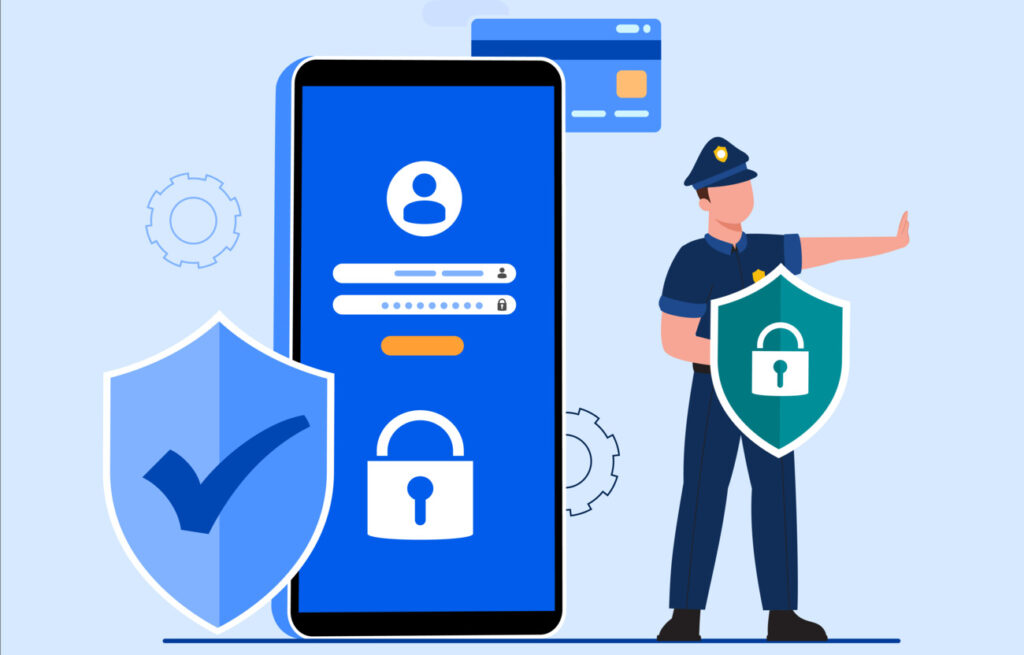
Real-Life Examples of Benefits and Risks of Sharing Personal Information Online
The digital landscape offers a multitude of opportunities and pitfalls, often coexisting in the same platforms and tools we use every day. While the benefits of sharing personal information online can be substantial—ranging from career advancement to emotional well-being—the risks can be equally dire, from identity theft to severe emotional trauma. Understanding these real-world examples can help individuals navigate online spaces with more caution and intention, fully aware of both the potential rewards and the inherent risks. Here are detailed examples that showcase both sides of the coin:
Benefits:
Networking and Career Opportunities
A software engineer in New York landed a job at Google by showcasing his skills and networking on LinkedIn. His profile caught the attention of a Google recruiter, leading to an interview and a subsequent job offer. This opportunity wasn’t just a job change; it was a career game-changer that provided not just a substantial salary hike but also opened doors to a vast network of professionals. The engineer could now work on cutting-edge technologies, boosting his professional development and marketability for the future.
Reconnecting with Lost Friends
A woman in Australia found her long-lost brother through a Facebook post shared by a mutual friend. After years of separation and unsuccessful searches, social media facilitated a heartwarming reunion. This reunion didn’t just mend an emotional gap; it restored a family. Thanks to the power of social media, the siblings were able to catch up on lost years and reintroduce their families to each other, creating a whole new set of relationships.
Crowdsourcing and Fundraising
A community rallied around a local family whose house was damaged in a fire, raising $50,000 in just one week through a GoFundMe campaign. Beyond the immediate financial help, the campaign brought the community together in a shared mission. The family also received donations in kind, like furniture and clothing, and the collective action even caught the attention of local businesses that offered to help in rebuilding their home.
Telehealth Services
During the COVID-19 pandemic, a resident in a rural part of Alaska was able to receive timely medical consultation through telehealth services, averting the need for a costly and time-consuming journey to a distant hospital. The experience provided more than just a medical prescription; it offered peace of mind and demonstrated the potential for technology to bridge gaps in healthcare access, particularly in remote or under-resourced areas.
Online Dating
A couple met through Match.com and, after several months of online dating and video calls, decided to meet in person. They are now married and have a child. Their love story showcases how online platforms can offer a modern path to meaningful relationships. It also dispels stigmas around online dating, demonstrating that technology can facilitate deeply personal connections that lead to happy marriages and families.
E-commerce Convenience
An interior designer was able to source unique furnishings from global markets, thanks to websites like Etsy and Alibaba, enhancing her business’s offerings. This expanded access to global markets not only improved her inventory but also increased her competitiveness and reputation for offering unique, quality items. She was able to attract a broader clientele who were interested in unique home decor that couldn’t be found in local stores.
Educational Opportunities
A working mom was able to earn her MBA online from a reputable university while balancing her family responsibilities and full-time job. The online education model provided her the flexibility to advance her career without compromising on family time. She could log in to live lectures or catch up with recorded ones according to her convenience, allowing her to successfully juggle multiple responsibilities.
Global Collaboration
A scientist in India collaborated with colleagues in Europe to co-author a groundbreaking paper on climate change, made possible by online data-sharing and communication tools. The paper had far-reaching implications, influencing policy decisions at a global level. The collaboration showcased how online platforms can transcend geographical barriers to bring together the best minds, accelerating scientific discovery and its subsequent impact on society.
Risks:
Identity Theft
The Equifax data breach in 2017 exposed the personal data of 143 million Americans, leading to cases of identity theft and financial fraud. This breach didn’t just impact the affected individuals in the short term; it had long-lasting repercussions, including reduced credit scores, difficulties in securing loans, and increased vulnerability to other forms of financial fraud. The emotional toll, stemming from the constant stress of monitoring one’s finances and legal identity, also can’t be overlooked.
Cyberbullying
The tragic case of Megan Meier, who took her own life after being cyberbullied on MySpace, underscores the emotional risks of online interactions. Beyond the immediate tragedy, it sparked a larger conversation about the responsibility of social media platforms to monitor and prevent harassment. It also led to legislation in some areas targeting online harassment, but the emotional toll on Megan’s family and community was irreversible.
Financial Fraud
Bernie Madoff’s Ponzi scheme ensnared victims who were lured by fraudulent online investment opportunities, resulting in billions of dollars in losses. Beyond the financial loss, the scandal eroded trust in financial institutions and online investment platforms. Some victims lost their life savings, which had cascading effects on their families, from educational opportunities to healthcare access.
Stalking
A woman experienced real-world stalking when her ex-boyfriend used information from her social media accounts to track her activities and show up at her workplace and home. This deeply intrusive act caused the woman to live in constant fear, affecting her mental health, work performance, and social interactions. It also led her to significantly limit her online presence, affecting her personal and perhaps even professional life.
Loss of Employment
Justine Sacco lost her job over a controversial tweet she made before boarding a flight to Africa, illustrating the professional risks of social media. Beyond losing her job, the public shaming led to an avalanche of online abuse, impacting her emotional well-being and making it difficult for her to find employment in the future. The incident served as a cautionary tale about the permanent nature of online actions.
Data Breaches
In 2013, Target suffered a data breach that compromised the financial data of millions of customers, shaking consumer trust and costing the company millions in lawsuits and lost sales. The breach had a ripple effect on the retail industry, causing other companies to invest heavily in cybersecurity measures, which indirectly impacted prices and customer experience. For the customers, it led to increased vigilance and anxiety regarding their personal data.
Reputation Damage
A college student was expelled for hate speech after screenshots of his offensive comments on a private forum were made public. Beyond the immediate educational setback, the student faced enormous challenges in rebuilding his reputation and pursuing other opportunities in life. The episode also raised questions about privacy and the extent to which online activities should be subject to public scrutiny.
Physical Risks from Location Sharing
A celebrity was robbed after posting real-time updates of a vacation, alerting thieves that the home was empty. Beyond the immediate loss of valuables, the celebrity had to invest in enhanced security measures and deal with the emotional trauma of having a personal space violated. This incident also served as a wake-up call for others, leading to increased caution about sharing location information online.
Conclusion
In today’s interconnected world, the advantages and disadvantages of sharing personal information online have never been more relevant. While platforms like LinkedIn and Facebook offer invaluable benefits for career networking and reconnecting with lost friends, the risks of sharing personal information online are increasingly concerning. Events like the Equifax data breach underscore the very real dangers of identity theft and financial fraud.
In conclusion, as we navigate the digital landscape, weighing the benefits of sharing personal information against the risks is crucial. Being aware of these risks, which include everything from cyberbullying to data breaches, is just as important as exploiting the many opportunities for professional growth, social interaction, and e-commerce convenience that the internet offers. Adopting robust security measures like strong passwords, two-factor authentication, and up-to-date software can help mitigate these risks, allowing us to reap the benefits of our online lives more safely.


